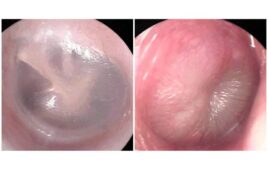Each year, about 1.38 million women worldwide are diagnosed with breast cancer. Advances in diagnosis and treatment have facilitated a 90 percent, five-year survival rate, among those treated. Given the increased rate and length of survival following breast cancer, more and more survivors are facing a life-time risk of developing breast cancer-related lymphedema; one of the most distressing and feared late onset effects.
Lymphedema, characterized by the abnormal swelling of one or more limbs, is most often the result of an obstruction or disruption of the lymphatic system over the course of the cancer treatment. Lymphedema usually manifests after a latent period of one, to five, or even as much as 20 years, after treatment. Consequently, lymphedema remains a major health problem, affecting 40 percent of the 3.1 million breast cancer survivors in the United States and exerting a tremendously negative impact on survivors’ quality of life.
“Similar to risk reduction and management of other chronic diseases (e.g., diabetes or heart disease), proactive and preventive education on signs and symptoms of lymphedema and risk reduction activities is essential for early identification and treatment of lymphedema,” says New York University Rory Meyers College of Nursing (NYU Meyers) researcher and professor, Mei R. Fu, Ph.D., RN, FAAN.
Researchers note, some 40 percent of breast cancer survivors never even receive information about lymphedema from their physicians, even though they are all potentially at risk. Research has shown that at least half of all survivors without a diagnosis of lymphedema have reported experiencing at least one lymphedema associated symptom, a cardinal sign of an early stage diagnosis and, “a key time to begin treatment before fluid build-up can be detected,” notes Dr. Fu.
To counteract the paucity of follow-up information and to augment early diagnosis and interventional treatment, Dr. Fu, Dr. Yao Wang (professor of computer engineering at NYU Tandon), Dr. Deborah M. Axelrod and Dr. Amber Guth (professor of surgery, NYU Langone Medical Center), and fellow NYU researchers developed “The Optimal Lymph-Flow” (TOLF), an electronic teaching system to assist breast cancer survivors in-home post-operative self-care.
They report their findings in a new study, published in mHealth (July 2016), “mHealth self-care interventions: Managing symptoms following breast cancer treatment.” The study describes TOLF’s research-based skills for the feasibility of developing innovative, safe, and easily-integrated-into-daily-routine self-care strategies to mitigate the onset of lymphedema.
TOLF consists of three electronic tools, accessible via any smartphone, tablet, or laptop, to assist in self-assessment, early diagnosis, and pain and symptom management. These three tools collect demographic and clinical information related to the survivor’s treatment history, daily self-inventories of occurrence and distress of symptoms, and avatar videos of at-home lymphatic exercises for those who experience any of the 22 lymphedema related symptoms even if they do not have a diagnosis of lymphedema, to provide management and relief of pain and symptoms.
“In usability testing of 30 patients, 90 percent of participants reported no problems of using the system, the other 10 percent reported only minor cosmetic issues; 93 percent reported total agreement in ease of use,” said Dr. Wang.
This NYU research team conducted a 12-week study of 20 survivors over the age of 21, who experienced pain and other lymphedema related symptoms. All the participants reported TOLF self-care intervention relieved pain and other symptoms and reduced the various negative aspects and impacts of having lymphedema symptoms.
“Easy access to high quality health information for lymphedema symptom management is essential for patient-centered care to achieve health equity. Participants loved the fact that they as patients can access TOLF at anytime and anywhere and learn about lymphedema, symptoms, and self-care strategies at their own pace,” said Dr. Fu.
Dr. Fu does note that the majority of participants were of relatively high educational levels and familiar with internet use, so further testing will need to be done with survivors of different characteristics.
Dr. Fu and others hope that the integration of TOLF into survivor’s daily lives will increase diagnosis and treatment before fluid build-up begins and significantly reduce the pain and negative impacts of lymphedema symptoms.
Dr. Fu and Dr. Wang have been awarded a NSF/NIH, three-year, technology innovation research award from the National Cancer Institute as part of a joint program on Smart and Connected Health. The R01 grant will allow Drs. Fu and Wang and their team to develop a precision assessment of lymphedema risk from patient self-reported symptoms through machine learning.
They plan to develop a Kinect-enhanced intervention training system, which can track patients’ movement and provide instant audio-visual feedback to the patient, to enable the patient to follow the prescribed movement more accurately, thereby making self-care intervention more effective. The innovation of precision risk prediction and intervention will be hosted in The-Optimal-Lymph-Flow mHealth system (TOLF).
_____________________________________________________________
Researcher Affiliations: Mei R. Fu1, Deborah Axelrod2,3, Amber A. Guth2,3, Kavita Rampertaap1,2, Nardin El-Shammaa1,2, Karen Hiotis2,3, Joan Scagliola2, Gary Yu1, and Yao Wang4, David Restor5
1 NYU Rory Meyers College of Nursing, New York University, New York, NY, USA
2 NYU Laura and Isaac Perlmutter Cancer Center, New York, NY, USA
3 Department of Surgery, New York University of School of Medicine, New York, NY, USA
4 Department of Electrical and Computer Engineering, Tandon School of Engineering, New York University, NY, USA
5 Technology and Client Services, NYU Rory Meyers College of Nursing, New York University, New York, NY, USA
Acknowledgements: This study was supported by National Institute of Health (NIMHD Project # P60 MD000538-03), Pfizer Independent Grants for Learning & Change (IGL&C) (grant #13371953), Judges and Lawyers Breast Cancer Alert (JALBCA), and New York University Research Challenge Fund (Grant # R4198) with Mei R. Fu as the principal investigator for all the grants. Its contents are solely the responsibility of the authors and do not necessarily represent the official views of the National Institute of Health and other funders. The funders had no role in the study design, data collection and analysis, decision to publish, or preparation of the manuscript.
About New York University Rory Meyers College of Nursing
NYU Rory Meyers College of Nursing is a global leader in nursing education, research, and practice. It offers a Bachelor of Science in Nursing, a Master of Science and Post-Master’s Certificate Programs, a Doctor of Philosophy in Research Theory and Development, and a Doctor of Nursing Practice degree. For more information, visit https://nursing.nyu.edu/.
(Source: Newswise)




